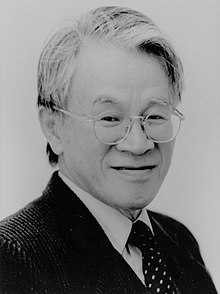Michio Morishima
Michio Morishima ( Japanese 森 嶋 通 夫 , Morishima Michio ; born July 18, 1923 in Osaka Prefecture ; † July 13, 2004 ) was a Japanese economist and professor emeritus of the London School of Economics (1970–1988 Sir John Hicks Professorship) and the university Osaka , member of the British Academy .
Live and act
Morishima began studying economics and sociology under Yasuma Takada . After graduating from Kyoto University , he taught both there and at Osaka University. From 1946 in Great Britain at the University of Essex and at the LSE. In 1965 he became the first Japanese president of the Econometric Society . In 1975 he was elected to the American Academy of Arts and Sciences .
His main interests were equilibrium theory, the history of economic thought and the social formation of capitalism . His goal was to expand the multisectoral growth model developed by John von Neumann in 1937 into a general equilibrium model. In addition, he subjected the theories of Karl Marx and Léon Walras to a review on the basis of the work of David Ricardo . His later work was increasingly critical of economic theory and its supposed unreality.
In 1976 Morishima was awarded the Order of Culture .
About Ricardo, Marx and Walras
For almost a decade, Morishima lectured at the LSE on Marx, Walras and Keynes in the light of contemporary economic analysis . This resulted in books on Marx and Walras, respectively. Even before the planned third book was finished, Morishima came to the discovery that Marx and Walras were by no means as diametrically opposed approaches as is the popular view. The transformation problem and the reproduction schemes in Marx ( Das Kapital , Vol. II) are equivalent or correspond to Walrass equilibrium analysis. At the very least, both economists used a number of the same tools in their systems analysis. Morishima traced this discovery back to the “guru” shared by both economists, namely David Ricardo. In Ricardo's Economics Morishima works out that in the times of Ricardo, Marx and Walras the theoretical core of economics consisted of an old form of equilibrium theory, which is completely different from the newer one, which is identified by names like Hicks , Arrow , Debreu , FH Hahn, Malinvaud and others. Morishima's main interest is not to rewrite the theoretical history, but to relate the analyzes of the classical economists to the problems of the more modern ones.
Works
- Equilibrium, Stability and Growth (1964)
- Theory of Economic Growth (1969)
- Marx's Economics (1973)
- The Economic Theory of Modern Society (1976)
- Why has Japan 'succeeded'? (1982)
- The Economics of Industrial Society (1984)
- Ricardo's Economics. A general equilibrium theory of distribution and growth. Cambridge University Press 1989. ISBN 0-521-36630-5
- What can Japan do? Proposals for an East Asian Community. 2005. ISBN 978-3-89129-890-9
literature
- Meghnad Desai: Michio Morishima, 1923-2004 . In: Proceedings of the British Academy . tape 138 , 2006, p. 259-281 ( thebritishacademy.ac.uk [PDF]).
Individual evidence
- ↑ Amartya Sen: The Discipline of Economics . In: Economica . tape 75 , 2008, p. 617–628 , doi : 10.1111 / j.1468-0335.2007.00660.x ( PDF file; 113 kB - first Morishima lecture at the LSE).
- ↑ Michio Morishima: Preface . In: Ricardo's Economics. A general equilibrium theory of distribution and growth . Cambridge University Press 1989. ISBN 0-521-36630-5 .
Web links
| personal data | |
|---|---|
| SURNAME | Morishima, Michio |
| ALTERNATIVE NAMES | 森 嶋 通 夫 (Japanese) |
| BRIEF DESCRIPTION | Japanese economist |
| DATE OF BIRTH | July 18, 1923 |
| PLACE OF BIRTH | Osaka prefecture |
| DATE OF DEATH | July 13, 2004 |
